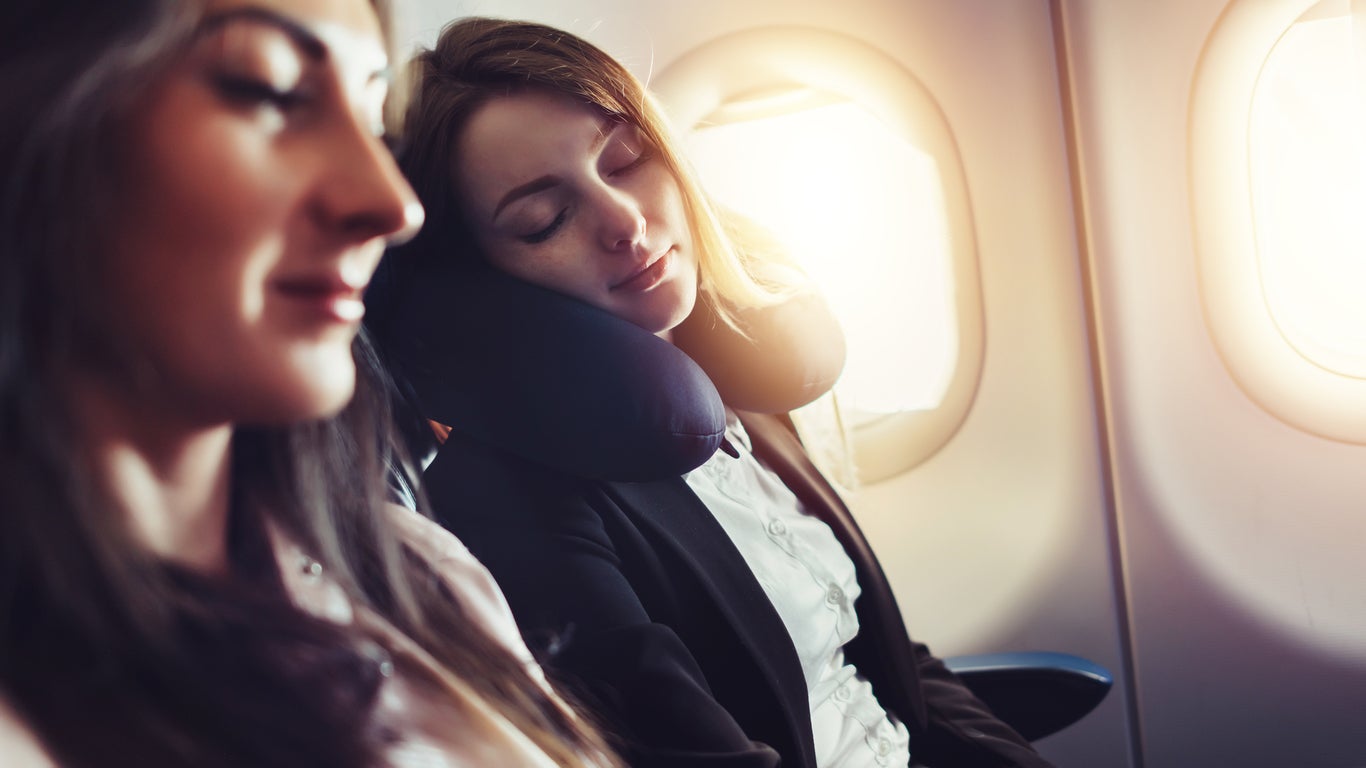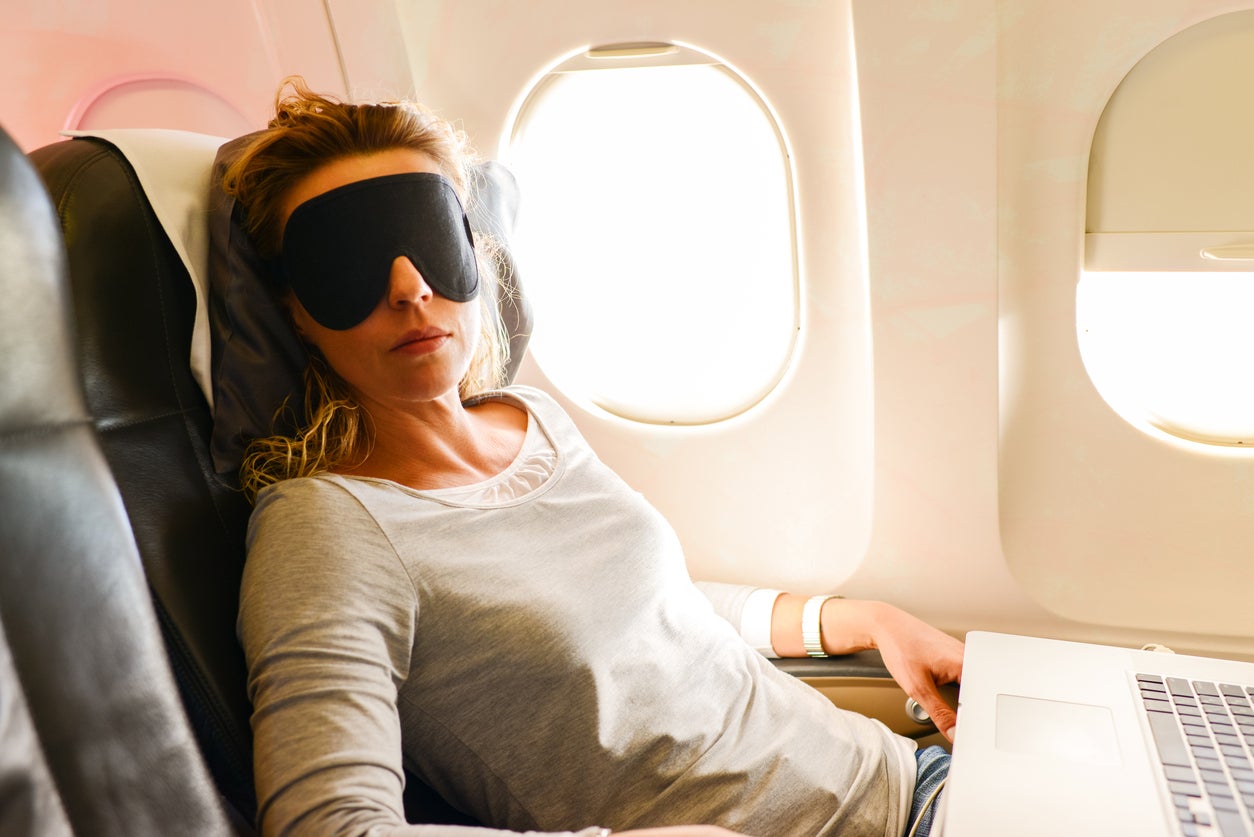How to fall asleep on a plane quickly
Got a long-haul flight approaching? Here are The Independent’s top tips for getting some shuteye to ease you into a new time zone

There are two types of people in this world – those who can sleep on flights, and those who can’t. The former spring out of their seat upon arrival at their destination, fresh-faced, clear-eyed and ready to throw themselves into the ways of a new country and culture.
The latter drag themselves sluggishly down the aisle, struggling to perform even the simplest of tasks, such as using the passport machine at security or articulating whether they’re here for “business or pleasure”.
If you happen to be one of these unfortunate souls, the start of any long-haul trip can quickly unravel as, both sleep-deprived and jet lagged, you’re barely able to function for at least 72 hours. But fear not – there are ways and means of securing a bit more shuteye. Here are our top tips for dropping off on board.
Grab a row
We all know the holy grail of sleep is managing to lie prostrate to create the illusion of being in a bed. Obviously you can guarantee this by stumping up for business class, but if you’re consigned to economy, give yourself a fighting chance by choosing a middle seat when booking. Couples and families are unlikely to go either side of you, preferring to stick together, and if it’s not a full flight you’ll have a greater chance of getting a row to yourself. Pick one towards the middle or back of the plane, rather than at the more popular front end of the cabin.
Should this fail, have a look around early on – can you spot any empty rows? If so, ask a member of cabin crew as soon as possible if it’s OK for you to switch and bag yourself some extra leg room.
Top tip: once you’re lying comfortably, make sure you put on your seat belt so it’s visible over the blanket. There’s nothing worse than being woken up by a flight attendant during turbulence to check you’re belted up.
Stick to your routine
It might seem silly, but preparing for “bed” the way you would at home means you’re more psychologically ready for sleep. Changing into pyjamas, brushing your teeth and removing your make-up/washing your face can all get you in the right mindset. If you normally always read before bed, do it now too – signal to your brain that the “being awake” portion of the day is officially over.
Get the right sleeping mask
There are sleeping masks and there are sleeping masks. As fetching as a faux-satin number with fun patterns might be, this is a practical item with only one real purpose – to block out the light so you can drift off. Plump instead for a functional black mask, with a soft lining and raised edges to create a truly dark interior.

Put in plugs
Just like a sleeping mask, the right ear plugs can be a game changer; for many people it’s the constant noise of the engine that makes it so hard to sleep on planes. It’s worth trying out a few different kinds beforehand to see whether you prefer the mouldable wax or foam variety – everyone’s ears are different, after all.
Take your own pillow
In the event that you have to sleep sitting up, one of those nerdy looking horse shoe-shaped neck cushions is actually very helpful – a lot more comfortable than trying to fashion the flat-as-a-pancake pillow provided into something remotely sleepworthy.
Switch off
Overstimulation is the enemy of sleep. As much fun as it is to catch up on all the films you missed at the cinema or play a game on your phone, using devices just before bed means your brain is all lit up like a Christmas tree. Plan when you ideally want to hit the hay and half an hour beforehand shut down the electronics – instead, do a bit of reading or, better yet, indulge in a 20-minute meditation to really calm the neurons.
Embrace booze
If you drink, having a glass of red wine, whisky, or whatever your chosen tipple may be in the hour before sleep can have a soporific effect. However, don’t overdo it – alcohol can feel like it affects you more at altitude and if you slip over into drunken territory, it won’t lead to the best night’s sleep. Plus having a hangover on a plane is far from ideal…
Scent yourself
The power of smell is more potent than you think. Using hand cream or essential oils which have sleep-inducing properties can help you relax and unwind. Scents that have a strong link with aiding sleep include lavender, vetiver, chamomile, ylang ylang, bergamot and sandalwood. Rub some on the back of your neck and dab a touch on your pulse points for some inner calm.

Drug up
While we don’t recommend trying to get class As through security, there are legal, over-the-counter sleep medications which can be helpful. Nytol, Kalms and valerian root extract pills are a gentle way of nudging you off to the land of nod. And if you happen to be passing through the US or Canada, pick up some melatonin from the pharmacy (they don’t sell it in the UK). This hormone is naturally occurring in the body, its main job being to regulate night and day cycles – darkness causes the body to produce more melatonin, which signals the body to prepare for sleep. It shouldn’t be overused, but pop one on a flight and prepare to drift off effortlessly; then pop another the first night of your trip to help beat jet lag.
No pressure
It’s easier said than done, but stressing about not being able to sleep is a sure-fire way of not being able to sleep. Try not to put too much pressure on yourself – instead just see it as a chance to rest your eyes for a bit. Get comfortable and relaxed, and remind yourself that it’s not the end of the world if you fail to get some shuteye. If you do, it’s a bonus. If you don’t… well, just hope they’ll accept your answer of “bleisure” as you stumble through security.
Join our commenting forum
Join thought-provoking conversations, follow other Independent readers and see their replies
Comments
Bookmark popover
Removed from bookmarks